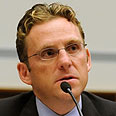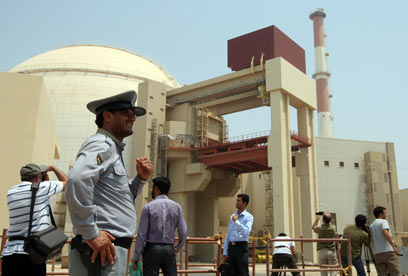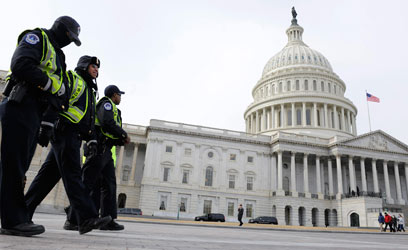
Man on a mission – Mark Dubowitz
צילום: הקרן להגנת הדמוקרטיות
The man who fights Iran
Mark Dubowitz dedicates himself to defending US against global terror, Iranian threat
WASHINGTON – While Iran takes pleasure in seeing the US and the world focusing on recent developments in the Arab world, one man ensures that the Iranian nuclear threat remain on the agenda. His name is Mark Dubowitz, the executive director of the Foundation for Defense of Democracies (FDD) and head of the independent organization's Iran Project.
The FDD (www.defenddemocracy.org) was established following the September 11 attacks and is sponsored by private donors and foundations concerned with defending the US against global terror and the Iranian threat.
Dubowitz's group employs 32 professionals and his project website, www.iranenergyproject.org, has turned into a user's manual on any issue pertaining to sanctions against Iran, ranging from various pieces of legislation to the monitoring their implementation and presenting the list of companies that no longer do business with the Islamic Republic.

Iran's nuclear reactor (Photo: AFP)
In the framework of his campaign to raise awareness for the Iranian threat, Dubowitz utilizes any available means. For example, he may arrive at a meeting in Canada's Prime Minister Office, and on the way there stop by a local TV studio and bluntly urge Ottawa to shift from talk to action.
While Dubowitz is soft spoken, his words reach deep. This modest man's TV appearances and the articles he writes for leading US newspapers are not meant to promote him personally, but rather, to embarrass and warn anyone still doing business with Iran.
At the age of 42, Dubowitz has turned into an authority on the Iranian issue, and the US Administration is eager to hear what he has to say about the sanctions imposed on Tehran. He appears at Congressional hearings and briefs US military officials, as well as senior Western officials.
Popular in Washington
One is amazed to discover that the US, a superpower boasting 16 intelligence agencies, nonetheless relies on the information and ideas of a man who heads an independent organization.Dubowitz himself told Ynet that he was uncomfortable being the subject of the article, lavishing praise on officials in the National Security Council, State Department, Treasury and Congress throughout the interview. These officials are working around the clock to address this highly important issue, he said.
"These are the real heroes who do not get the credit," he said.
So why does the US Administration need Dubowitz and his people? A senior aide in an important Congressional committee told Ynet that "nobody in this town dedicates so much time and effort to one issue. Mark and his research team do an excellent job. If we have a question, they are the first ones we turn to."

Sought after by Congress (Photo: Reuters)
The aide said that receiving such information from intelligence officials takes time and requires plenty of paperwork, while Dubowitz' people "work quickly and are accessible."
"They come to us with information and with ideas. In order to pass legislation on the matter, we need good ideas," he said
Shining star in business world
Dubowitz' personal history may be the factor that makes the difference. He arrived from the business sector, where the bottom line matters most and was on the fast track to major success, working in the venture capital industry and focusing on fundraising for early-stage technology companies. He also served as director of international business development for DoubleClick, later acquired by Internet giant Google.Business, investment and the law are major milestones in Dubowitz's life journey. He was born in Johannesburg and grew up in Canada, completing his law degree in Toronto and graduating with honors with a master’s in international public policy from Johns Hopkins University. On top of that, he also studied in Jerusalem's Hebrew University and in Paris.
However, despite his great business success, Dubowitz chose to focus on realizing his true dream.

Turning point: September 11 (Photo: AP)
"I was a strange kid with an obsession with terrorism and plane hijackings. On September 11th it turned out that terrorism is not just an international problem, after it hit us at home," he said. "I was deeply fearful for the future and decided to quit the private sector and come to Washington, to see if I could make a small difference. In 2003 I joined a small organization (FDD) despite not having any relevant political or policy experience and coming from a wholly different background."
Quick response time
Dubowitz does not produce thick studies that gather dust at research institutes, but rather, responds quickly to immediate needs, provides information and offers solutions."We closely monitor international companies that do business with Iran, invest in Iran's energy sector and provide important equipment and technologies to this sector," he said, adding that his organization also monitors the movement of commercial vessels coming into and leaving Iran.
"We look for ships that arrive from North Korea and are interested in suspicious vessels that change their flag more than once," he said. "We also follow ships that take suspicious routes and transfer uranium from Africa or arms, for example…we have no way of knowing what's inside these ships, but we provide information about the movement of suspicious vessels to the US Administration."
Dubowitz says that his organization's goal is not only to closely monitor companies doing business with Iran, but also to analyze Tehran's response to the sanctions.
"It’s a chess game. Iran seeks loopholes in US legislation and opportunities to circumvent it," he said. "When we discover something that we deem to be of great significance, we write about it in the press, talk about it on television, or quietly approach our friends in the Administration and in Congress."
Military strike? Not now
Dubowitz does not think that now is the right time for military strikes on Iran."The sanctions are working by putting pressure on the regime, although they have not secured their objective and may never do so – putting an end to Iran's nuclear program. The best way is to work towards changing the regime. Any deal cut with this regime will be violated."
Dubowitz notes that the US and Europe have failed in providing moral and material support that could have been decisive during the Iranian protests of June 2009.

Striking Iran? Not now (Photo: AFP)
"The Administration realizes this, and has started to change its tone," he said, adding that the next measures against Iran will take the form of tighter personal sanctions against senior Islamic republic officials and their supporters, a move that got underway a few days ago after the European Union blacklisted 32 senior Iranian officials. The US also extended its own list, including 10 more senior figures in Ahmadinejad's regime.
"This is an important step. The Administration is changing its policy and now comes the phase of exerting direct pressure on those who carry out the regime's decisions in the area of human rights," Dubowitz said. "This is a key move. The objective here is to single them out personally, to isolate and alarm them. From now on they must think twice before murdering and torturing their own people."
"I believe that in the coming weeks, Congress will present comprehensive human rights and democracy promotion legislation that will target individuals and international companies involved in oppressing Iranians," Dubowitz summed up." "These sanctions will help to undermine Iran's moral legitimacy and hopefully turn it into a pariah state. and the members of congress and their hard working staff behind all these measures deserve the gratitude of all people who are threatened by this brutal and dangerous regime."
- Follow Ynetnews on Facebook










